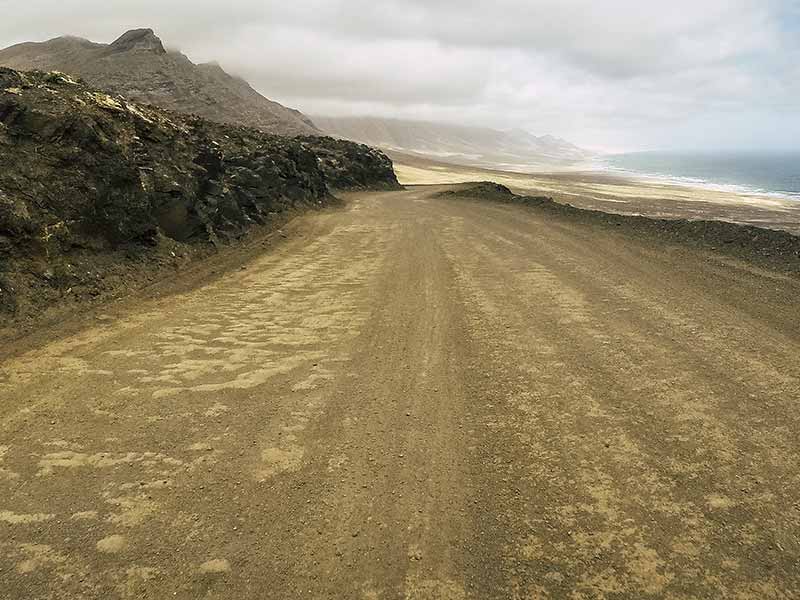Tires – they’re the unsung heroes of your vehicle, dutifully carrying you from point A to point B, rain or shine, summer or winter. But have you ever stopped to consider the epic battle of versatility and endurance that goes on under your car? Today, we’re taking you on a journey to explore the showdown between all-season and all-terrain tires.
All-Season Vs All-Terrain Tires
All-season tires offer a balance of performance, comfort, and efficiency, making them suitable for moderate weather conditions and regular city or highway driving.
All-terrain tires are designed for tougher conditions, providing better traction on off-road surfaces and in severe weather, though they may sacrifice fuel efficiency and ride smoothness.
In this article, we’ll delve into the world of all-season and all-terrain tires, comparing their pros and cons, their performance in different conditions like snow and rain, their impact on fuel efficiency, and their lifespan. We’ll also provide guidance on when it might be best to choose one over the other.
Let’s take a closer look.
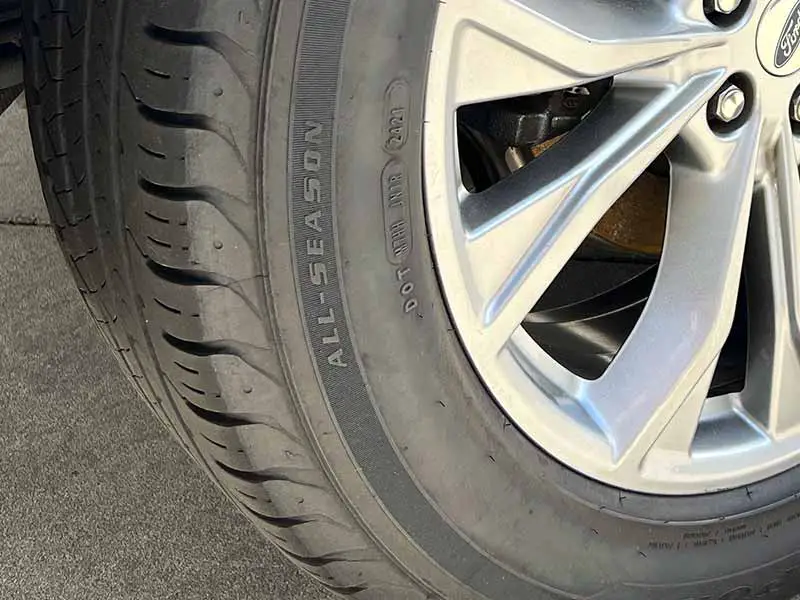
Understanding All-Season Tires
All-season tires, just as the name suggests, are designed to handle a variety of road conditions and weather – all year round. Whether it’s summer’s scorching heat or fall’s pesky leaf-strewn streets, all-season tires are built to take them on. But remember, these are the jacks of all trades, not necessarily the masters of all.
Now, let’s talk about when to use all-season tires. If your typical day involves commuting to work, taking the kids to school, or just running errands around town, all-season tires might be your best friends. They’re perfect for daily driving in mild climates with light-to-moderate rain, light snow, and standard road conditions. If you live somewhere without extreme weather changes and drive mainly on paved roads, then all-season tires are a practical choice.
Now onto the juicy part – the pros and cons. Let’s break it down:
Pros of All-Season Tires
- Versatility: These tires are designed to handle a range of conditions, from dry pavement to wet roads and even light snow. No need to switch tires as the seasons change!
- Quiet Ride: Compared to their all-terrain counterparts, all-season tires tend to be quieter. If you value a peaceful ride, all-season tires might be your ticket to tranquility.
- Highway-Friendly: These tires are often more comfortable for highway driving because of their design, offering smoother rides and better speed handling.
Cons of All-Season Tires
- Not for Extreme Conditions: While they’re good for many conditions, all-season tires might not cut it in severe weather or tough terrains. Deep snow, heavy rain, or off-road adventures can be challenging for these tires.
- Towing Limitations: If you frequently tow heavy loads, all-season tires might not provide the best traction. This could make towing less stable and more difficult.
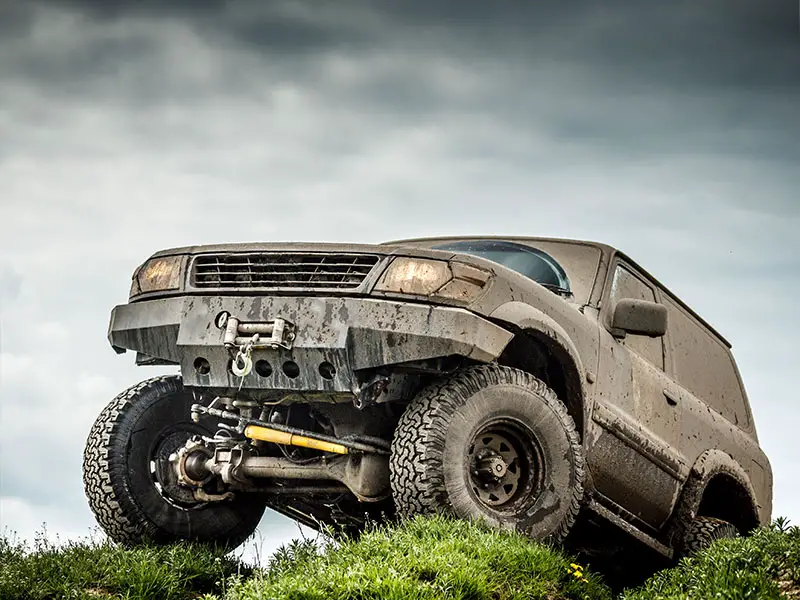
Understanding All-Terrain Tires
What are all-terrain tires exactly? Picture this: you’re cruising along, off the beaten path, your tires hugging the rugged terrain like a pro. That’s what all-terrain tires are all about. They’re designed to handle both on-road driving and off-road exploration with ease. Think mud, gravel, sand, rocks – all-terrain tires say “bring it on”!
When should you use all-terrain tires? If you often find yourself veering off paved roads and exploring less tame landscapes, these are the tires for you. They’re perfect for those who live in rural areas or love outdoor adventures. And yes, if you often tow or haul heavy loads, all-terrain tires can be a game-changer!
Just like with all-season tires, all-terrain tires have their upsides and downsides. Let’s explore:
Pros of All-Terrain Tires
- Off-Road Capability: This is where all-terrain tires shine. They can handle a variety of challenging surfaces, making them perfect for off-roading, camping trips, or any outdoor adventure.
- Strong in Harsher Weather: Whether it’s heavy rain or a good amount of snow, all-terrain tires are designed to perform well in more extreme weather conditions.
- Long-lasting: Typically, all-terrain tires are built to last. They’re made with tougher materials that can stand up to the rough and tumble of off-road use.
Cons of All-Terrain Tires
- Noise: Compared to all-season tires, all-terrain ones tend to be a bit noisier on the road. If you mostly drive on highways or in the city, you might find the extra noise a bit annoying.
- Fuel Efficiency: Because of their heavy-duty design, all-terrain tires can reduce your vehicle’s fuel efficiency. It’s a small price to pay for their superior off-road abilities, but still worth considering.
- Less Smooth On Highways: While they are built for adventure, all-terrain tires might not provide the smoothest ride on highways or city streets.
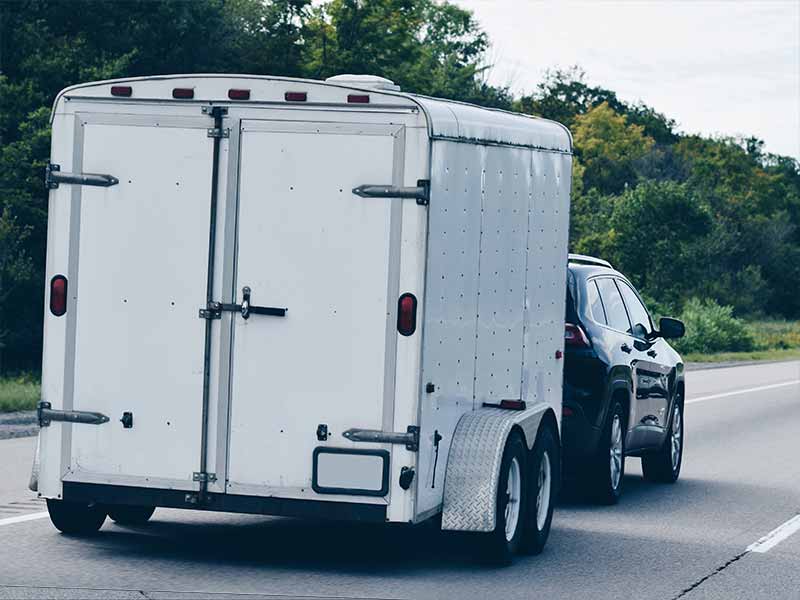
Towing: All-Season Vs All-Terrain
Let’s start with all-season tires. These guys are designed for a comfortable, quiet ride on paved roads and can handle your daily driving needs just fine. But when it comes to towing, things can get a little shaky. If you’re towing lighter loads, all-season tires should do the trick. But for heavier loads or in less-than-ideal weather conditions, they might struggle. The traction isn’t always as strong as you’d need it to be, and that can make towing feel less stable.
Now, let’s switch gears and look at all-terrain tires. Remember when we said these tires were built for action? That includes towing. All-terrain tires have a more aggressive tread design and are made from tougher materials, meaning they can provide the extra grip and strength needed for towing heavier loads. They can handle a variety of surfaces, which is great if you’re towing a trailer off-road or in harsh weather conditions.
But here’s the catch – while all-terrain tires might be the towing champions, they’re not always the best for fuel efficiency. Towing already uses more fuel, and all-terrain tires can increase fuel consumption even more. So, if you’re planning a long towing trip, that’s something to keep in mind.

Highway Driving: All-Season Vs All-Terrain
If you spend most of your time on highways and city streets, all-season tires are your trusty co-pilots. They’re designed to provide a smooth, comfortable, and quiet ride, which is just what you want for those long highway cruises. Plus, all-season tires usually offer better fuel efficiency, which means fewer stops at the gas station and more miles of uninterrupted driving.
But it’s not all sunshine and rainbows. While all-season tires are great for standard highway conditions, they might struggle a bit if the weather takes a turn for the worse, like in heavy rain or snow.
Now, let’s turn the spotlight on all-terrain tires. These tough guys are built to handle a wide range of surfaces, and that includes highways. They can certainly handle the job, but it might not be as smooth or quiet a ride as with all-season tires. Plus, all-terrain tires can make your vehicle consume more fuel, which means you might find yourself pulling into the gas station a bit more often.
However, if the highway is slick with rain or covered in a blanket of snow, all-terrain tires can offer better grip and handling. They’re also a good option if your highway driving often includes towing or hauling heavy loads.

Winter Driving: All-Season Vs All-Terrain
Starting with all-season tires, they are designed to perform reasonably well in light winter conditions. So, if you live in an area where winters are mild and you rarely see more than a light dusting of snow, all-season tires could be all you need. However, when the snow starts piling up and the roads become icy, all-season tires may struggle to provide the grip and control you need.
Now, let’s shift gears and look at all-terrain tires. These guys are built tough, and they can generally handle heavier snow and slush better than all-season tires. They have a more aggressive tread pattern, which can provide better traction in snowy or icy conditions. But keep in mind, not all all-terrain tires are created equal. Some are specifically designed to excel in winter conditions, while others might not perform quite as well.
It’s also worth noting that while all-terrain tires can handle more severe winter conditions than all-season tires, they’re not necessarily the best option for all winter driving. There are specialized winter or snow tires that are designed to provide optimal performance in snowy and icy conditions. If you live in an area with heavy snowfall or icy winters, you might want to consider these.
Winter tires will beat out both as dedicated winter tires for use on paved surfaces. If your normal driving conditions include severe winter weather and you don’t venture off-road, winter tires will be a better choice.

Fuel Efficiency: All-Season Vs All-Terrain
Are you ready to pump some knowledge into your brain? Let’s discuss how all-season and all-terrain tires affect your vehicle’s fuel efficiency.
Let’s start with all-season tires. These tires are designed to have a lower rolling resistance, which means they require less energy to roll down the road. Less energy means less fuel, making all-season tires a more fuel-efficient choice. If you’re the kind of person who cringes at the thought of frequent stops at the gas station, all-season tires might be your best friend.
But what about all-terrain tires? Well, as much as we love their ruggedness and versatility, we have to admit, they’re not the champions of fuel efficiency. Because of their aggressive tread design and heavier construction, all-terrain tires typically have a higher rolling resistance. This means your vehicle needs to use more fuel to keep them rolling.
However, there’s a bit more to the story. While all-terrain tires might consume more fuel, they also provide better traction and durability, especially in tough conditions. So, if you frequently drive off-road or in harsh weather, the increased fuel consumption might be a fair trade-off for the performance and safety these tires offer.
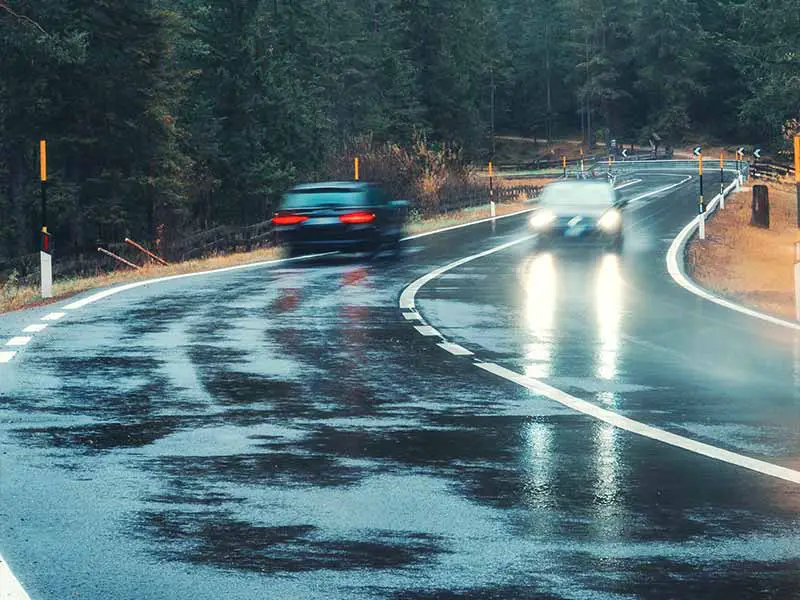
Rainy Weather: All-Terrain Tires to the Rescue?
Imagine this: the sky opens up, and a downpour begins. How would all-terrain tires fare in this situation? Let’s find out!
All-terrain tires are made to handle various conditions, and yes, that includes rain. Their aggressive tread patterns are designed to provide good traction, not just off-road, but on wet roads too. The deep grooves help channel water away from the tire, reducing the risk of hydroplaning.
But let’s not forget about all-season tires in rainy conditions. These tires also have features designed to handle wet roads. Their tread patterns are designed to evacuate water and maintain good contact with the road, helping to provide reliable grip in wet conditions.
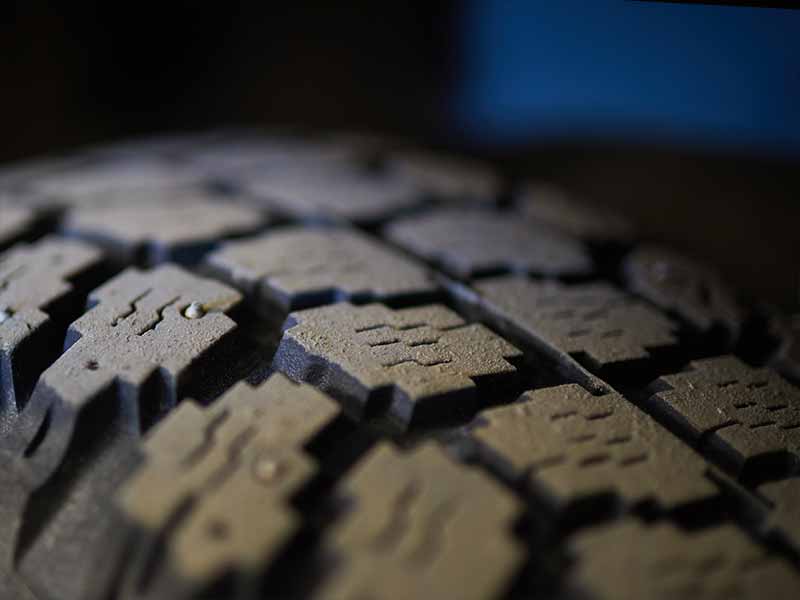
Lifespan: Do All-Terrain Tires Last Longer?
How long a tire lasts can be a big deal, right? After all, no one wants to be swapping out tires every few months. So, do all-terrain tires outlast all-season tires? Let’s investigate!
All-terrain tires are designed to be tougher than all-season tires. They’re built to withstand rough off-road conditions, and that generally translates to a longer lifespan. The chunkier tread patterns and stronger construction can often resist wear and tear better than the smoother, softer all-season tires.
However, the actual lifespan of a tire depends on a bunch of factors, not just its type. Things like your driving style, the conditions you drive in, and how well you maintain your tires can all affect how long they last. For example, if you regularly drive off-road or tow heavy loads, your tires might wear out faster.
What about all-season tires? While they may not be as rugged as all-terrain tires, they still have a decent lifespan. These tires are designed for typical daily driving conditions, and with proper care, they can last a good while.
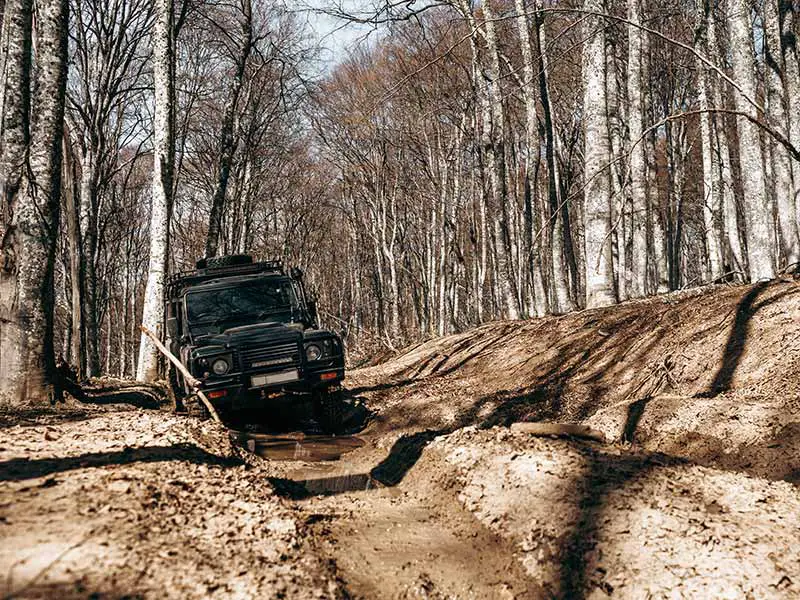
When Should You Get All-Terrain Tires?
All-terrain tires are a good choice when you frequently drive in a variety of conditions, especially ones that involve tough terrains and harsh weather. Here are a few scenarios when all-terrain tires could be a great fit:
- You’re an off-road enthusiast: If your idea of a good time involves dirt trails, rocky paths, or sandy dunes, all-terrain tires can be your best buddies. They’re designed to provide excellent traction and durability in these conditions, helping you tackle your off-road adventures with confidence.
- You live in a rural area: If your daily commute involves gravel roads or uneven surfaces, all-terrain tires can offer better performance and durability compared to all-season tires.
- You face severe weather conditions: All-terrain tires can handle a range of weather conditions, from heavy rain to snow. If you live in an area where the weather often gets extreme, all-terrain tires could be a good choice.
- You often tow or haul heavy loads: All-terrain tires are built tough, which can come in handy when you’re pulling a trailer or carrying heavy loads. If towing or hauling is part of your regular driving, consider going the all-terrain route.
Remember, all-terrain tires are typically noisier and less fuel-efficient than all-season tires. But if your driving conditions match some of the scenarios above, the benefits of all-terrain tires can outweigh these downsides.

When Should You Get All-Season Tires?
Let’s flip the coin and talk about when it might be a good time to opt for all-season tires.
All-season tires are designed to handle a variety of common road and weather conditions, making them a great choice for many drivers. They’re ideal for those who mostly drive on paved roads and experience a range of weather from sunny to mildly snowy. Here are some situations where all-season tires might be your best bet:
- You live in an urban or suburban area: If you spend most of your time driving on city streets and highways, all-season tires can provide the smooth, quiet ride you’re looking for. They’re designed for these kinds of roads and can handle the typical bumps and holes you might encounter.
- You experience moderate weather conditions: All-season tires can handle a range of weather conditions, from sunshine to rain to light snow. If you live in a place with moderate weather, all-season tires can meet most of your needs.
- Fuel efficiency is a priority for you: All-season tires typically offer better fuel efficiency compared to all-terrain tires. If you’re conscious about your fuel consumption (and who isn’t these days?), all-season tires might be a good choice.
- Comfort and noise level matter to you: All-season tires are usually quieter and provide a more comfortable ride compared to all-terrain tires. If you value a peaceful and smooth drive, all-season tires might be the way to go.
Keep in mind, while all-season tires are versatile, they’re not the best at any one thing. They may struggle in severe winter conditions, and they’re not designed for heavy off-road use. But for many drivers, the balance of performance, comfort, and efficiency that all-season tires offer is just right.
Resources
Below are some links you may find helpful when learning about tires
- All-terrain vs all-season tires: Which is right for you? – GetJerry.com
- All-season versus all-terrain tires – Tire Buyer
Final Thoughts
There’s no ‘one-size-fits-all’ answer in the world of tires. The best choice depends entirely on your specific needs and driving conditions.
All-season tires shine in moderate weather conditions and regular city or highway driving, offering a smooth, quiet ride and better fuel efficiency.
All-terrain tires take the lead when it comes to off-road adventures, towing heavy loads, and navigating harsh weather conditions, providing superior traction and durability at the expense of some fuel efficiency and ride smoothness.
Good luck and happy motoring.
